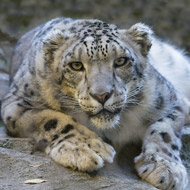
IUCN updates Red List of Endangered Species
The snow leopard has been removed from the IUCN Red List of Threatened Species.
In a press release, the IUCN said that the snow leopard had moved from the endangered to vulnerable category.
It added that the species population continues to decline and is still at risk of extinction through habitat loss and degradation. Fall in prey, competition with livestock, persecution, and poaching for the illegal wildlife trade are also cited as reasons for the species’ decline.
‘Thanks to significant investments in conservation for this species, including anti-poaching efforts, initiatives to reduce conflict with livestock, and awareness-raising programmes, conditions in parts of the Snow Leopard’s range have improved,’ the press release said.
‘It is essential to continue and expand conservation efforts to reverse its declining trend and prevent this iconic cat from moving even closer to extinction.’
The Snow Leopard Trust, which has argued for the status to remain Endangered, said that it was strongly opposed to the change: “We believe the best available science does not justify it, and that it could have serious consequences for the species,” it said in a statement.
The organisation added that it will be calling on the IUCN to revisit the decision through the appropriate channels.
The snow leopard is assessed as vulnerable because the global population is estimated to be more than 2,500 but fewer than 10,000 mature individuals.
It is believed that significant investments in conservation measures to reduce threats may have helped to slow the species' decline. These include the establishment of new protected areas in snow leopard range; more effective anti-poaching measures; and training of range country conservation professionals.



 The veterinary mental health charity Vetlife is inviting the veterinary community to join it for a sponsored cold-water dip.
The veterinary mental health charity Vetlife is inviting the veterinary community to join it for a sponsored cold-water dip.